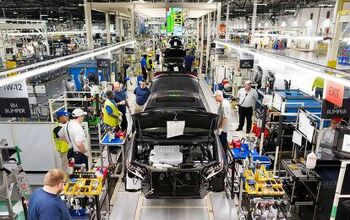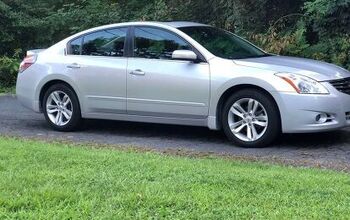Britain Hops On The Soul Train
Kia’s Soul has hit the shores of Britain, and early feedback from the last bastion of English-language automotive print journalism credibility is looking promising. The Soul faces stiff competition in Old Blighty, taking on a pallette of available small cars, wagons and CUVs that American buyers can only imagine. And with European expectations for small car quality as high as they are, if the Soul is going to fall flat the Brits would sure let us know ahead of time. Instead, the reviews seem to indicate that the Soul is no less brand-redefining than Hyundai’s Genesis.
Gavin Conway of the Times of London indicates this possibility in his recent test drive, calling the US-bound Soul “quite good” looking. Quality? “The cabin is one of the best Kia has built,” writes Conway. “All the controls are simple and easy to understand, and the materials and finish are a match for those of Japanese rivals, as is build quality.” And though Conway admits that “nobody is ever going to buy a Kia because they are looking for the ultimate driving experience,” he notes that “the Soul does better than expected in that department.”
The boys at the Sun were some of the first to drive the Soul, and Phil Lanning and Ken Gibson call it “cool,” “funky,” “agile,” “a fantastic value.” Lanning concludes his first test drive by saying “this is the first Kia with heart and soul — and so many will fall in love with it,” while Gibson names it a “Trump Car” of ’09.
Meanwhile, Talking Motors has picked up on the building hype, adding it to the new Prius and BMW M3 as potential “top cars of 2009.” The only problem? Every British reviewer prefers the 45 mpg (us gallons, non-EPA) 1.6 liter diesel which is not planned for the American release. And none of them have reviewed the 2.0 gas engine that will power the majority of American Souls. And all fanboyishness aside, TTAC has not yet driven this car. Nor do we take any other keyboard jockey’s word for anything other than their opinion. Still, if Kia is getting the brand redefinition chatter in the entry level market that the Genesis has received upmarket, the elder Niedermeyer’s words should be well-heeded. The Japanese need to watch their backs.
More by Edward Niedermeyer
Latest Car Reviews
Read moreLatest Product Reviews
Read moreRecent Comments
- SCE to AUX Range only matters if you need more of it - just like towing capacity in trucks.I have a short-range EV and still manage to put 1000 miles/month on it, because the car is perfectly suited to my use case.There is no such thing as one-size-fits all with vehicles.
- Doug brockman There will be many many people living in apartments without dedicated charging facilities in future who will need personal vehicles to get to work and school and for whom mass transit will be an annoying inconvenience
- Jeff Self driving cars are not ready for prime time.
- Lichtronamo Watch as the non-us based automakers shift more production to Mexico in the future.
- 28-Cars-Later " Electrek recently dug around in Tesla’s online parts catalog and found that the windshield costs a whopping $1,900 to replace.To be fair, that’s around what a Mercedes S-Class or Rivian windshield costs, but the Tesla’s glass is unique because of its shape. It’s also worth noting that most insurance plans have glass replacement options that can make the repair a low- or zero-cost issue. "Now I understand why my insurance is so high despite no claims for years and about 7,500 annual miles between three cars.


































Comments
Join the conversation
They should sell a 1.4 TDI in the US.
The question remains - how much more will Americans pay for a diesel version versus the petrol version? Most buyers would go out there and find the per-gallon delta between petrol and diesel and then discover that it doesn't make sense to pay more for the diesel version versus the gasoline version. Maybe there's some tax credit, but for the most part simple math doesn't work out. But if you do see a diesel in the USA, it's often followed with smarmy comments about how stupid it was to offer a diesel at a premium. So for now, you don't see many diesels powering passenger cars in the USA. The problem is that diesels cost more to produce than the gasoline counterparts (both materials and warranty). So if you can't charge more for it, then it turns out you lose money offering the diesel to an American buyer. But there are a few incremental sales you gain by being the only diesel in town... so there is some benefit in establishing onself as "the" diesel nameplate. But for most carmakers, there isn't much sense to offer a diesel in the USA. Things may change when Americans accept that paying more for the diesel powertrain is desirable without doing any calculations to find the consumer breakeven pricing point.